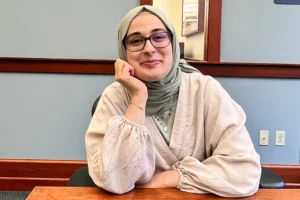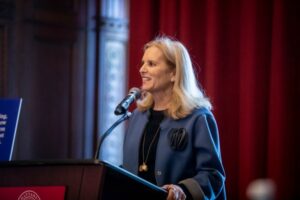“It felt so good” to see Governor Newsom sign Assembly Bill 2608 into law on July 15, 2024, exclaimed Saanvi Arora, a 2023-2024 John Lewis Young Leaders (JLYL) Fellow. AB 2608, drafted and lobbied for by Arora and other students, is a bill which ensures that students on college campuses in California receive critical education and resources about drug-assisted sexual assault, a problem that is all too pervasive on college campuses and often severely underreported.
According to RAINN, the nation’s largest anti-sexual violence organization, 26.4% of female students and 6.8% of male students experience rape or sexual assault as an undergraduate, but only 20% report to law enforcement. And in a survey of 6,064 students across three universities, more than 1 in 13 students reported being drugged, most commonly with Rohypnol, underscoring the high number of drug-assisted sexual assaults on college campuses and highlighting the need for increased preventative measures.
Arora, who worked on mental health policy in high school, became interested in substance abuse and harm reduction while working on Title IX in college. She saw a gap between the experiences of students on campus and the way universities discussed sexual violence, especially the prevalence and risks of drug-assisted sexual violence, which, she observed, “left students vulnerable.”
Her approach to helping resolve the education and resource gap was two pronged. First, she wanted to add a new section to the required California safety curriculum that would increase awareness of causes, symptoms, and effects of drug use and overuse, and inform people about where to seek care for related circumstances. Second, she hoped to ensure campus health centers offered flumazenil to counteract the effects of Rohypnol, the drug most commonly associated with drug-assisted sexual assault.
As part of her JLYL fellowship, Arora learned different strategies about successfully approaching and uniting diverse stakeholders, a skill she used to solidify support for her bill. After meeting with campus student groups and health centers in a series of discussions and town hall meetings, she was able to ascertain the scope of the current problem and work with student-run, health focused groups on campus to design the most effective curricula about drug safety.
Arora partnered with a number of students and campus groups to draft mock curricula and to lobby for the Assembly Bill which she wrote herself. After talking with several lawmakers, she was able to secure the support of state Assembly member Jesse Gabriel, chair of the Budget Committee for the California State Assembly. He introduced her bill in February 2024 and the bill was signed into law in July 2024.
The bill, backed by student groups and statewide social justice organizations such as IGNITE and the Student Senate for California Community Colleges, establishes post-secondary drug education training and accessible resources on campus for those who are victims of involuntary drug consumption and those suffering from drug misuse.
Since the bill passed, it has been endorsed by the State Assembly’s Higher Education Committee as a formal recommendation in their Title IX overhaul package and it has been included in several advocacy agendas for external NGOs including survivor-representing allies. Additionally, the bill has shaped conversations about the federal standardization of protections for survivors of drug-facilitated sexual violence on college campuses.
While “students have tangible ideas for policy solutions, and their experiences can be transformational in changing the laws around them,” Saanvi notes that there are structural inequities that can keep students from fighting for change, including lack of access to money to go lobby at the state level. JLYL “established a safety net of support” financially for Saanvi, allowing her to pay for other students to come with her to Sacramento to lobby, a key component to getting this bill passed. She also received support from her JLYL cohort as they encouraged her throughout the process.
“I think a lot of the time people, especially students and young people, overlook how they can impact public policy. Oftentimes voting is viewed as the ceiling when it comes to engagement for young people. But,” Saanvi said, “I think this was really a testament to how you could be creative with your civic engagement and find your voice in the institutions that otherwise seem too complex and far away for you to impact.”

Saanvi just finished a tech policy internship at the Center for Democracy Technology. She is in her Junior year at UC Berkeley where she is now serving in the student government.



